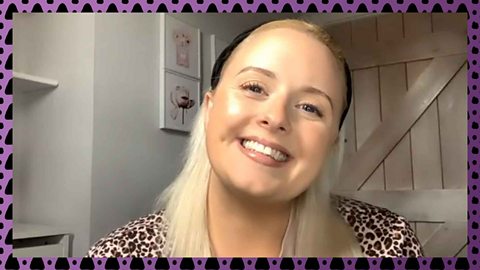This article was first published in April 2021.
Written by trauma and creative psychotherapist, Tasha Bailey.
When was the last time someone told you to be more positive? Or maybe they told you ‘not to worry’, an impossible task when there’s so much going on for you.
These blanket statements can be harmful. They can make us feel like we need to close down some of our feelings. This is an example of what has become known as ‘toxic positivity’ in popular culture, which can show up with our friends, parents, teachers and especially on social media.
 Image source, iarti
Image source, iartiWhat is 'toxic positivity'?
‘Toxic positivity’ can be defined as the assumption that we should always have a positive outlook, even if we are in emotional or physical pain. It is the unrealistic idea that acting more positive and happy will make us feel better. But in reality, it's a way of shutting down our very real and human feelings and can often make us feel worse.
Some examples of 'toxic positivity' are:
- Being told to smile (even when you don’t want to)
- Being told to ‘Think positive’ or ‘Be optimistic’
- 'Don’t be so negative’
- ‘You have nothing to be stressed about’
- ‘Other people in the world have it worse than you’
- Hashtags on social media like #GoodVibesOnly or #PositiveVibesOnly.
So ‘toxic positivity’ is often how we respond to other people. However, we might also direct it inwardly towards ourselves.
For some, 'toxic positivity' has become a coping strategy: a way to block how we feel. It’s important to acknowledge and feel all of our feelings – the good and the bad – because by dismissing them, we might act as though we are not fazed by them, as a way of trying to feel less anxious. However, this often squashes down our feelings temporarily, before they eventually resurface again with full force.
 Image source, iarti
Image source, iartiWhen positive thinking becomes unhelpful
Optimism can be defined as hopefulness and confidence about the future. This is a good and nurturing thing, and allows us to believe that we will heal and survive the difficult moments. Optimism acknowledges when times have been tough, whilst also holding hope for things to change. This differs from ‘toxic positivity’ which unhelpfully ignores the difficult emotions. As a result, we can feel ignored and unheard, as though people are not listening to our REAL feelings.
It can also make us feel that we are being a burden to others, leaving us with feelings of shame. Shame is a particularly heavy feeling which makes us feel bad, leading us to avoid and mask our feelings altogether. We start to believe that we can’t tell anyone about our situation, adding isolation and loneliness to what we are already feeling.
 Image source, Martin Novak
Image source, Martin NovakA 2018 study by Brett Ford and colleagues from University of Toronto and Berkeley argued that the more we accept our negative emotions, the more this promotes our mental health. Through laboratory, diary and longitudinal studies, they concluded that acknowledging our feelings reduces distress and anxiety symptoms.
So instead of expressing ‘toxic positivity’ to our friends or even to ourselves, it’s important that we start to provoke more honest and meaningful conversations instead. Real talk about the good, bad and ugly feelings will help us to feel heard, accepted and will lighten our emotional load.

To have more meaningful conversations with friends, try some of these:
- Kindly challenge them - When you find yourself on the receiving end of ‘toxic positivity’, politely tell them that it isn’t helpful. It’s okay to tell them how you would prefer to be supported, so that they can learn to do better.
- Dive deeper - Due to the culture which we live in, we often start conversations with small talk which do not give space to honesty. If you feel comfortable enough in your social circle, start to challenge this by asking your friends “how are you really feeling?" It may open up a deeper conversation, which will also strengthen your friendship.
- Connect with empathy - When a friend shares a difficult emotional experience, ask yourself how it makes you feel. Whether you find yourself feeling panic, sadness or anger, this could be a snapshot of how your friend has been feeling. This is the first step for true empathy, a really good tool for understanding how the other person feels too. Our empathy skills generally get a lot better when we become adults, but practising this now will be helpful to you and your friends.
- Don’t give solutions - Try not to give your friends solutions or positive slogans if they’re in a tough place. Instead try saying things like ’I hear you‘, ‘that sounds hard, I’m sorry’ or ‘how can I help?’.
- Find a trusted adult - You don’t have to hold all the responsibility for someone else’s difficulties and not for your own difficulties either. Find an adult that you trust, or a professional such as a GP, school counsellor or a local mental health service. Also look out for podcasts, Instagram accounts and safe online spaces where you can hear other stories and experiences that fit your own. This can be really affirming and can make us feel less alone.
All in all, don’t be afraid of emotions. Emotions are incredible superpowers designed for humans to understand what’s going on for them inside. Even the most difficult and uncomfortable emotions deserve to be respected and taken care of by you and your support circle.

If you need support
You should always tell someone about the things you’re worried about. You can tell a friend, parent, guardian, teacher, or another trusted adult. If you're struggling with your mental health, going to your GP can be a good place to start to find help. Your GP can let you know what support is available to you, suggest different types of treatment and offer regular check-ups to see how you’re doing.
If you’re in need of in-the-moment support you can contact , where you can speak to a counsellor. Their lines are open 24 hours a day, 7 days a week.
There are more links to helpful organisations on ¥ÛœÛ¥´√Ω Action Line.

How to support a friend with their mental health
Katie Thistleton with advice from Young Minds on how to support a friend with their mental health.

Dr Radha: Healthy ways to express your feelings
Check out Dr Radha's top tips for processing your feelings during difficult times.

The irony and the illusion of perfectionism
Natasha Devon on how perfectionism can be counter-productive.
